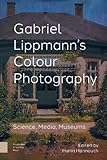Gabriel Lippmann's colour photography : science, media, museums / edited by Hanin Hannouch.
Material type: TextPublication details: Amsterdam : Amsterdam University Press, (c)2022.Description: 1 online resourceContent type:
TextPublication details: Amsterdam : Amsterdam University Press, (c)2022.Description: 1 online resourceContent type: - text
- computer
- online resource
- 9789048554010
- 9048554012
- TR530 .G337 2022
- COPYRIGHT NOT covered - Click this link to request copyright permission: https://lib.ciu.edu/copyright-request-form
| Item type | Current library | Collection | Call number | URL | Status | Date due | Barcode | |
|---|---|---|---|---|---|---|---|---|
 Online Book (LOGIN USING YOUR MY CIU LOGIN AND PASSWORD)
Online Book (LOGIN USING YOUR MY CIU LOGIN AND PASSWORD)
|
G. Allen Fleece Library ONLINE | Non-fiction | TR530 (Browse shelf(Opens below)) | Link to resource | Available | on1336401969 |
Includes bibliographies and index.
Frontmatter -- Table of contents -- Gabriel Lippmann's Colour Photography: A Critical Introduction -- Part I The Science of Colour Photography and the Colour Photography of Science -- 1. How Lippmann Froze Light and Passed It around for Others to Taste -- 2. Lippmann's Interferential Colour Photography: A Juncture between the Histories of Spectroscopy and Photography -- 3. Colour Under the Microscope: Santiago Ramón y Cajal Does 'Histology' on Lippmann Heliochromes -- 4. Lost in Description: The Misunderstanding of Frederic Ives (1856-1937) and the Experiments of His Son Herbert (1882-1953) on Lippmann's Interference Photography -- Part II Media History, Aesthetics, and Culture -- 5. Lippmann Photography and the Problems of Media Historiography -- 6. Richard Neuhauss's Stuffed Parrot: Interferential Colour Photography, Taxidermy, and Projection -- 7. Brilliant! Enthusiasm for the Aesthetic Qualities of Lippmann's Interferential Photography -- 8. From Maxwell to Mercury: The Cultural History of Gabriel Lippmann's Colour Photography -- Part III Contemporary Reception and Future Trajectories -- 9. Materiality, Identification, and Conservation of Lippmann Plates -- 10. Exhibiting Gabriel Lippmann: A Collaborative Challenge -- 11. Modern Lippmann Photog -- 12. "It's not just a picture, it's a magical object": Interview with Contemporary Lippmann Photographer Filipe Alves -- Afterword: Building Bridges over Standing Waves -- Index
Physicist Gabriel Lippmann's (1845-1921) photographic process is one of the oldest methods for producing colour photographs. So why do the achievements of this 1908 Nobel laureate remain mostly unknown outside niche circles? Using the centenary of Lippmann's death as an opportunity to reflect upon his scientific, photographic, and cultural legacy, this book is the first to explore his interferential colour photography. Initially disclosed in 1891, the emergence of this medium is considered here through three shaping forces: science, media, and museums. A group of international scholars reassess Lippmann's reception in the field of the history of science, where he is most recognised, by going well beyond his circles in France and delving into the complexity of his colour photography as a medium that challenges various historiographies. Moreover, they focus on the interferential plate as a material object in need of both preservation and exhibition, one that continues to fascinate contemporary analogue photographers. This volume allows readers to get to know Lippmann, grasp the interdisciplinary complexity of his colourful work, and ultimately expand his place in the history of photography.
COPYRIGHT NOT covered - Click this link to request copyright permission:
There are no comments on this title.
